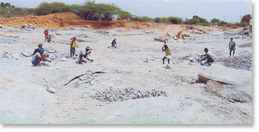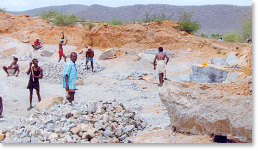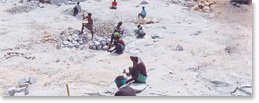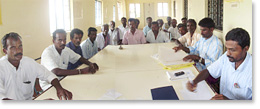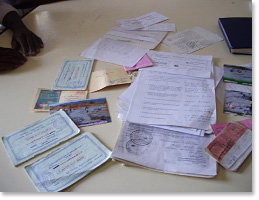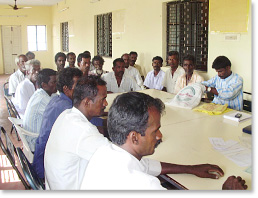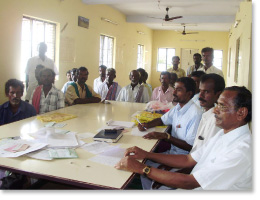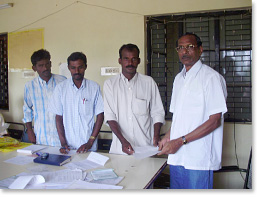|
Quarry Workers’ Struggle
The panchayat system came in to existence, when the rulers envisaged that the governance through parliamentary system failed to address the issues of the nation and did not meet the needs and wants of the socially, economically and politically deprived people in India. So, they formed panchayat government in order to uplift and empower the suppressed communities at the grassroots level by making them participate in the local governance.
for their Livelihood Right United Struggle, the Fulcrum for Sustaining Empowerment by L.A. Samy and AREDS Documentation Team Renganathapuram, Tamil Nadu, India However, even in the grassroots governance, the chances of oppressed people to empower themselves are very minimal or rather denied and in addition, they have to vie with the economically, socially and politically privileged people in the society. Unless the oppressed people become aware of the situation they live in and their rights, they cannot even sustain their livelihood resources. The story of the quarry workers of Thogaimalai, who have been supported by AREDS, is a case in point for the above-mentioned statement. The story vividly narrates how the poor quarry workers’ welfare is haunted by the vested interest of a union chairman, who is supposed to be one of the protagonists in strengthening the grassroots democracy. It also exposes the tacit support of the state machinery in favouring the union chairman. AREDS: Quarry Workers story The unorganized labourers of Tamil Nadu suffer lack of job and secured income and other gross instabilities that are constant threats to their lives and livelihoods. So, AREDS has organized these workers, who have been involved in irregular employment and who remain unorganized, of Karur district under Karur District All Labourers’ Union (KADALU). Besides, AREDS has long been working among quarry workers in the district. Breakaway from the traditional practice The Change As they collectively owned the quarry, they changed their working condition suitably, worked hard and enhanced their income. Then with an increase in their income, they spent enough on food and their children’s education. When they were asked what difference the collective ownership on the quarry had brought about in their life, they said in one voice, “When we were working under private ownerships, we were treated like bonded labourers and we did all the works that were assigned to us. More so, the owners made a huge profit out of our toil. When we became the owners, we obtained all the profits and divided them among ourselves. How much we earned does not matter, the dignity and the freedom we enjoyed does matter.” Mr. Gunasekaran said, “We had to beseech the owner to lend money for our day-to-day expenditures. That was not the case when we owned the quarry. But the collective ownership changed our condition and enabled us to disburse the wages to the workers before their sweat got dried out.” Mr. Selvaraj, the president of this quarry association said, “We did not fix that much margin of profit as the other owners did. We fixed a reasonable margin and we supplied stones to a family whose house was gutted with fire. All we had to spend is for clearing off the bushes around the quarry, pumping out the stagnant water stored in the mine-shaft and procuring explosives. Rest of all was our profit.” In the wake of improving their economic condition, the collective ownership had also improved their talent in book-keeping. They did not appoint anybody to maintain accounts, records of number of stones cut, expenditure and revenue but they did themselves. When asked if they could take care of accounting on their own, Mr. Manivel – who is studied up to 8th standard only and taking care of accounting, writing minutes of their meetings, maintenance of records and the like – confidently said, “ We can do it ourselves. We maintain an accounting system and the financial report and the resolutions taken are presented in the meeting for the approval of the members. It helps us maintain transparency.” They also expressed that if they appoint a person from outside, then they will have to dance to the accountant’s tune and will become bonded labourers again. They also advise other self-help groups that are mining to take care of accounting on their own in order to avert any misleads. They are a heterogeneous mixture Quarry work is the second prime livelihood resource than agriculture in Thogaimalai block. The youth and the adults belong to different castes and religions and go for quarry work. This group comprises people who belong to dalit, backward and the most backward communities. Their workmanship unites them beyond caste barriers. All of them enjoy equal participation in the association meetings and all. It was a struggle in the midst of vested interests There are several quarries in the Thogaimalai block. A passerby can notice signboards, telling the names of the self-help groups that own the quarries. It may seem to be a good sign of development of the members of those self-help groups but there is more in it than it meets the eye. Most of these quarries are being run by the well paid government officials or well-off people or politically influential persons in the name of self-help groups. The government is allocating quarries to self-help groups, aiming at the development of women and men at the grassroots level. But these people are clever enough to secure license to run the quarries in the name of bogus self-help groups. They engage quarry workers and earn surplus profit. There is no collective ownership on the quarries. Much ado about renewing the quarrying license In the meantime, the quarrying license expired on 03.08.2006. They were instructed by the Additional Director of the Department of Mines that they should register their groups under SGSY for getting their license renewed, as per the quarry Act 1975, when they approached the department for renewing the license. In accordance with his instruction, AREDS helped them form an SGSY Welfare Association and register it under SGSY on 28.09.2007 at Trichy. It imparted training to the workers on self-help groups and the roles and responsibilities of Animators and Representatives. It also facilitated them to avail Rs.25, 000 as a revolving fund with Rs.10, 000 as subsidy from the government. On 14.11.2008, a savings bank account was also opened -- A/C 2091 - for the SGSY Welfare Association with PACB at Trichy. In this process of renewing the license, the workers were called for a meeting with the District Collector at the collectorate. The collector asked for the testimonials of affiliation of the members with the Women Development Programme, DRDA and SGSY and the audited statement of the association. The collector also sought an affidavit from the revenue department officials -- the Village Administrative Officer, the Revenue Officer, Tehsildar and of course, the Collector -- proving their quarrying for five years. The members humbly furnished every detail the collector had sought for renewing the license. AREDS helped them write petitions to the collector and guided them in their lobby interventions. But, the collector told them that “to renew the license or not to renew” will be announced in the first week of October 2009. Back to economic setback These workers made use of the opportunity given to them and improved their economic status. They all rose from the state of employees to owners when they were granted a license to run the quarry. After acquiring collective ownership, they ascertained their collective ownership through their toil and efforts. Since they were the owners, they were able to supply stones freely to build a house for a fire-hit family and proved their fellow feeling and the concern for the affected people. It all happened, just because they owned a quarry. But it all ended on 03.08.2006, when the validity of their license expired. The expiry of the quarry license left these workers back in the arms of bonded labour. The dignity, the economic improvement, and the social status they acquired in all those five years were put at stake. They had to work as quarry workers again and they did. It was depressing for them because they, who knew all the anomalies happening in quarrying and the government process, had to work in the bogus self-help groups. Organisation and development is the concept behind the formation of self-help groups and that is why government itself is promoting them and encouraging other agencies which promote them. These workers are self-help group members. Their association has been registered. They have been affiliated with Women Development Programme. They have their won savings bank account. The workers have availed themselves of the revolving fund under SGSY. They had obtained license for quarrying from the Department of Mines and run a quarry for five years. What prevents the District Administration from issuing the license back to the license holders then? What could be wrong in issuing a license? Nepotism plays a key role The prime aim of any government -- headed by a definite political party or by the patchwork of different political parties -- is to serve the people. But each government -- of course, headed by a certain political party -- favours its own party people in allocating government tenders or issuing license to start trade and the like. Therefore, the ruling party members fight tooth and nail to get the favour of the government; they even spend their own money for the election campaign of their party. In return, the party allocates government contracts and tender to those party men who spent much for the victory of the party. However, the party prefers party men who are relatively richer and manipulates the government machineries to favour them. The party, which has assumed the governmental power, never bothers about the downtrodden masses and oppressed communities. Hence, nepotism has become a universal phenomenon in this world of capitalist democracy -- with little variation in its intensity among nations -- and has hampered the process of human development as such. The present Tamil Nadu government, headed by Dravida Munnetra Kalagam (DMK), is a living example that illustrates how nepotism reverses the process of human development. In the case of the quarry workers, the same infernal nepotism played a key role that caused a long delay in the process of renewing the quarry license. The Union Chairman of Thogaimalai union belongs to the Dravida Munnetra Kalagam -- the political party which is ruling the state government -- and had an eye for the chance of capturing the lease contract of the quarry. So, his intrusion clubbed with the collector’s favoritism is the cause for the delay. Lessons learnt by the workers from their struggle They also became aware that it was their united struggle that made the district administration consider their genuine demands. Though they are a collective of different castes, the fellow-feeling and the unity among them only led them to undertake such a protracted struggle. They are articulate about this and they have determined to remain united in all hardships in the future. Presently, the renewal of the quarry license is under process and the perseverance of the workers persists. On the occasion of the International Human Rights Day celebration, a detailed account was deposed to the district Judge who was present and they were assured of the action from the courts. This is one other evidence of collective and conscious struggle to make their rights sustain and again it is another evidence to prove the poor are always the victims and to retain their little economic upcoming they need always to run pillar to post. First published by Association of Rural Education and Development Service (AREDS), Renganathapuram & Post, Krishnarayapuram Taluk, Karur District, Tamil Nadu, India.
Published in In Motion Magazine January 10, 2010 Also see:
|
If you have any thoughts on this or would like to contribute to an ongoing discussion in the  What is New? || Affirmative Action || Art Changes || Autonomy: Chiapas - California || Community Images || Education Rights || E-mail, Opinions and Discussion || En español || Essays from Ireland || Global Eyes || Healthcare || Human Rights/Civil Rights || Piri Thomas || Photo of the Week || QA: Interviews || Region || Rural America || Search || Donate || To be notified of new articles || Survey || In Motion Magazine's Store || In Motion Magazine Staff || In Unity Book of Photos || Links Around The World NPC Productions Copyright © 1995-2018 NPC Productions as a compilation. All Rights Reserved. |


